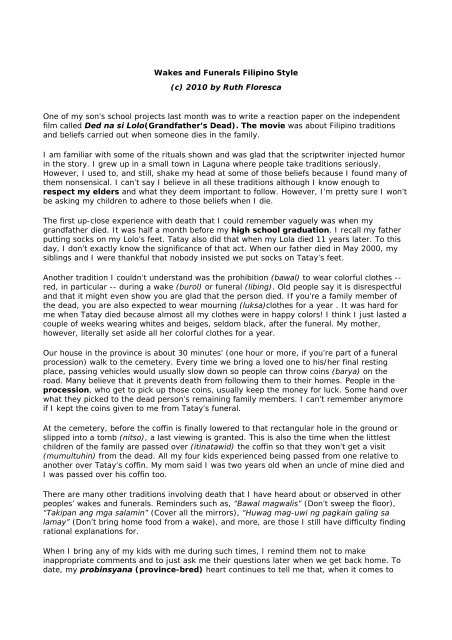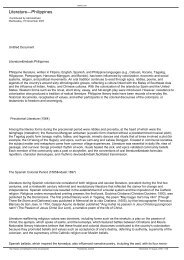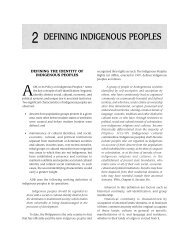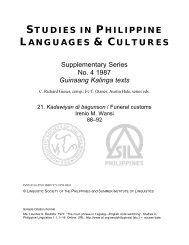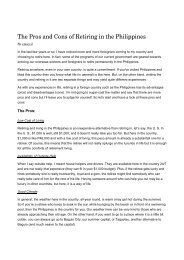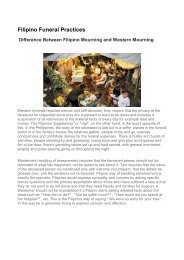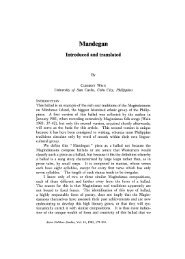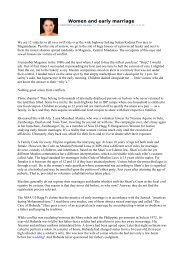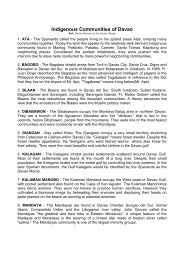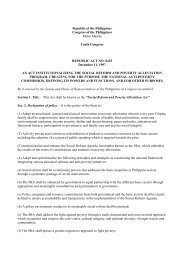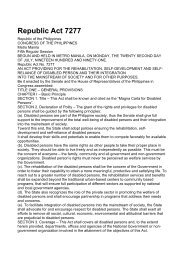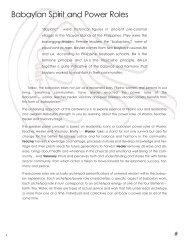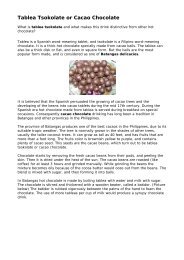Wakes and Funerals Filipino Style - Philippine Culture
Wakes and Funerals Filipino Style - Philippine Culture
Wakes and Funerals Filipino Style - Philippine Culture
- No tags were found...
Create successful ePaper yourself
Turn your PDF publications into a flip-book with our unique Google optimized e-Paper software.
<strong>Wakes</strong> <strong>and</strong> <strong>Funerals</strong> <strong>Filipino</strong> <strong>Style</strong>(c) 2010 by Ruth FlorescaOne of my son’s school projects last month was to write a reaction paper on the independentfilm called Ded na si Lolo(Gr<strong>and</strong>father’s Dead). The movie was about <strong>Filipino</strong> traditions<strong>and</strong> beliefs carried out when someone dies in the family.I am familiar with some of the rituals shown <strong>and</strong> was glad that the scriptwriter injected humorin the story. I grew up in a small town in Laguna where people take traditions seriously.However, I used to, <strong>and</strong> still, shake my head at some of those beliefs because I found many ofthem nonsensical. I can’t say I believe in all these traditions although I know enough torespect my elders <strong>and</strong> what they deem important to follow. However, I’m pretty sure I won’tbe asking my children to adhere to those beliefs when I die.The first up-close experience with death that I could remember vaguely was when mygr<strong>and</strong>father died. It was half a month before my high school graduation. I recall my fatherputting socks on my Lolo’s feet. Tatay also did that when my Lola died 11 years later. To thisday, I don’t exactly know the significance of that act. When our father died in May 2000, mysiblings <strong>and</strong> I were thankful that nobody insisted we put socks on Tatay’s feet.Another tradition I couldn’t underst<strong>and</strong> was the prohibition (bawal) to wear colorful clothes --red, in particular -- during a wake (burol) or funeral (libing). Old people say it is disrespectful<strong>and</strong> that it might even show you are glad that the person died. If you’re a family member ofthe dead, you are also expected to wear mourning (luksa)clothes for a year . It was hard forme when Tatay died because almost all my clothes were in happy colors! I think I just lasted acouple of weeks wearing whites <strong>and</strong> beiges, seldom black, after the funeral. My mother,however, literally set aside all her colorful clothes for a year.Our house in the province is about 30 minutes’ (one hour or more, if you’re part of a funeralprocession) walk to the cemetery. Every time we bring a loved one to his/her final restingplace, passing vehicles would usually slow down so people can throw coins (barya) on theroad. Many believe that it prevents death from following them to their homes. People in theprocession, who get to pick up those coins, usually keep the money for luck. Some h<strong>and</strong> overwhat they picked to the dead person’s remaining family members. I can’t remember anymoreif I kept the coins given to me from Tatay’s funeral.At the cemetery, before the coffin is finally lowered to that rectangular hole in the ground orslipped into a tomb (nitso), a last viewing is granted. This is also the time when the littlestchildren of the family are passed over (itinatawid) the coffin so that they won’t get a visit(mumultuhin) from the dead. All my four kids experienced being passed from one relative toanother over Tatay’s coffin. My mom said I was two years old when an uncle of mine died <strong>and</strong>I was passed over his coffin too.There are many other traditions involving death that I have heard about or observed in otherpeoples’ wakes <strong>and</strong> funerals. Reminders such as, “Bawal magwalis” (Don’t sweep the floor),“Takipan ang mga salamin” (Cover all the mirrors), “Huwag mag-uwi ng pagkain galing salamay” (Don’t bring home food from a wake), <strong>and</strong> more, are those I still have difficulty findingrational explanations for.When I bring any of my kids with me during such times, I remind them not to makeinappropriate comments <strong>and</strong> to just ask me their questions later when we get back home. Todate, my probinsyana (province-bred) heart continues to tell me that, when it comes to
age-old traditions, we should always honor what other people believe in <strong>and</strong> want to do in theirown homes or with their families no matter how bizarre they seem. The bottom line is,whatever I think does not, <strong>and</strong> should not, matter.Glossarymagluksa – to mourn; pagluluksa mourning ; nagluluksa the act of mourning; nagluksamourned; ipinagluksa mourned overBurol – wake; Lamay wake; nakaburol in a coffin <strong>and</strong> not yet buried; pinaglalamayan mournedover by people who are in the wake; naglalamay spending long time visiting in a wake (usuallyovernight)Libing – funeral; ilibing to bury; ililibing due for burial; inilibing buried; nalibing buried;tumawid - to cross; tumatawid crossing; tatawid will cross; tumawid crossed; itinawid helpedto cross; itinatawid being helped to cross; itatawid will be helped to cross; magtawid tofacilitate/do the crossing; magtatawid will do/facilitate the crossing; nagtawid facilitated/didthe crossingRef.: http://www.english-to-tagalog.com/wakes-<strong>and</strong>-funerals-<strong>Filipino</strong>.html


